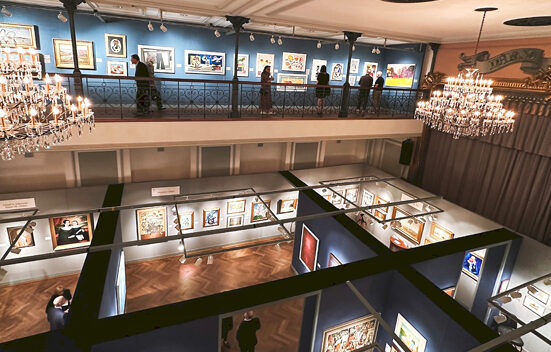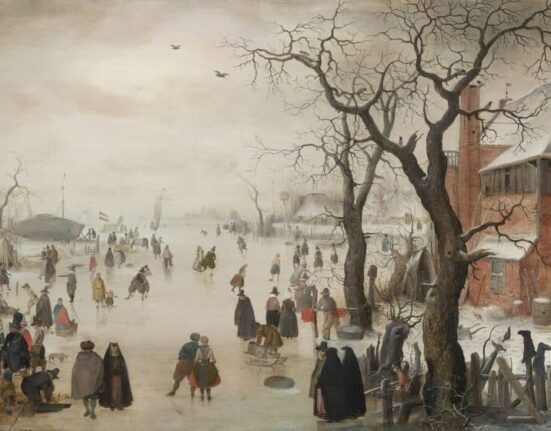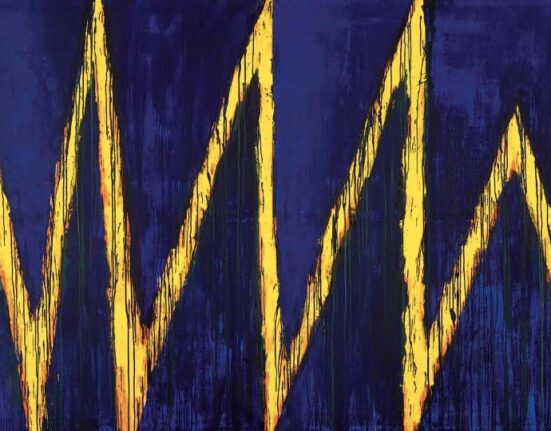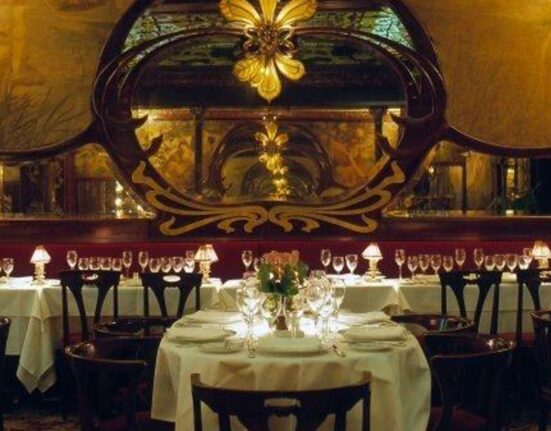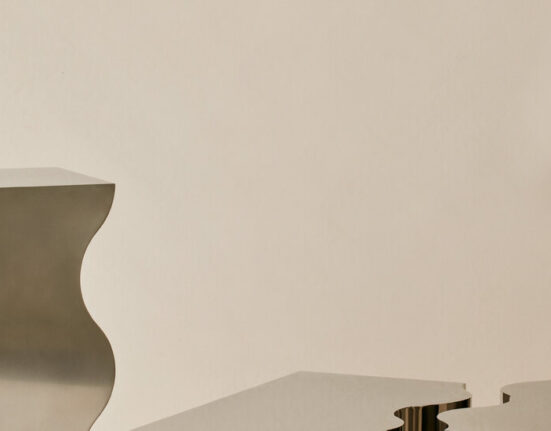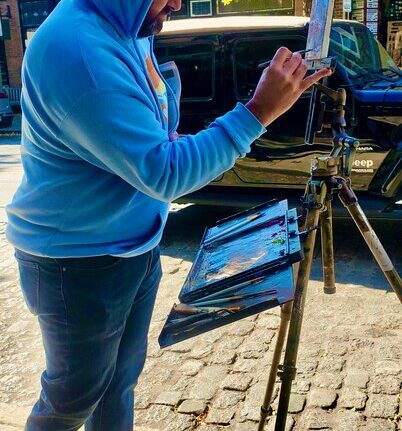For the 6,625-strong Romanian community living in Luxembourg, 1 December – or National Day – is an important celebration with business and cultural events taking place on or around that date.
“National Day is a fundamental milestone within the country and for those that are abroad,” says Romanian Ambassador to Luxembourg, Alexandrina-Livia Rusu. The day, says Rusu, commemorates the Great Union of 1 December 1918 and the right of Romanian people to self-determination. It united the provinces of Bessarabia, Bukovina, and parts of Banat, Crişana and Maramureș, with the Kingdom of Romania, into modern Romania.
“All Romanians see it as a day of reflection and to celebrate national identity – we are very proud of being Romanian,” says Rusu, adding that there is normally a military parade under the triumphal arch in Bucharest, which also commemorates the country’s participation in the First World War, followed by performances of traditional music and dance, and a culinary celebration.
Concerts, theatre, choirs and film
In Luxembourg there are 10 Romanian associations, and the Embassy organises theatre, music, art exhibitions and helps choose the films and guests representing the country in the CineEast festival.
One of the newest associations is RoKultur. Raluca Caranfil is one of its founding members. She came to Luxembourg 10 years ago having worked in Ireland and now works as a journalist and communicator.
RoKultur started as a group of eight friends with a common passion for embroidery. In October, they organised four workshops of Saxon Embroidery at the A Possen museum on the Moselle Valley for Heritage Days.
“We went to shows and exhibitions in neighbouring countries and thought, why not bring these events to Luxembourg,” says Caranfil.
RoKultur hosted embroidery workshops at ‘A Possen’ museum for Heritage Days in September © Photo credit: RoKultur
“We went to shows and exhibitions in neighbouring countries and thought, why not bring these events to Luxembourg,” says Caranfil.
The organisation will host a National Day celebration on 2 December at the cultural centre in Cents. Tickets are available to anyone, although the event will be in the Romanian language, “but all of us speak English, most French, and some Luxembourgish, so there will be someone who can translate,” says Caranfil.
Travel back in time
A highlight will be a talk by Anita Sterea, who is well-known “as the Romanian historian who made history cool”, says Caranfil. “We will talk about how Romanians used to celebrate the winter holidays, what they did and what they cooked, such as the traditional dish of Sarmale, where meat, rice and vegetables are rolled in cabbage, or Cozonac, a sweet bread like brioche, and Covrigi, a small pretzel. We’ll also decorate the tree with special ornaments.”
Ambassador Rusu highlights that 1 December is the pre-Christmas period in the Romanian Orthodox religion, which traditionally requires fasting and no consumption of meat, eggs or diary, but an increasingly popular dish at celebrations is a bean stew and smoked pork dish made in huge pots.
Caranfil explains that “once Romanians have settled in a job with their children at school, they still need to socialise.” The Romanian Church meets every Sunday and there is a Romanian school on Saturday mornings where children can learn to sing, speak Romanian, read stories and play instruments, to connect with Romanian culture informally.
She also hosts a Romanian show on Radio Ara every other Tuesday from 13.00 to 14.00 which is available on Spotify and other streaming platforms.
“I interview Romanians living in Luxembourg and neighbouring countries, such as Florin Balaban, who draws cartoons for Luxemburger Wort and also founded the Comics Museum in Vianden, or Mariana Florea, who runs The Network, but also actors, writers, and musicians who live and work in Luxembourg.” Caranfil says it’s important to tell their stories and to promote events.
Strengthening economic and business connections
Whilst several associations keep cultural events alive, Romania has strong business and economic ties with Luxembourg. It signed the Treaty of Accession to the EU at Neumünster Abbey in April 2005. More recently, Ambassador Rusu went to Bucharest where the Embassy co-organised a space conference – and the Luxembourg Space Agency signed a Memorandum of Understanding with its Romanian counterpart, further expanding connections between the two countries.
“A well integrated and dynamic community,” says Romanian Ambassador to Luxembourg, Alexandrina-Livia Rusu (pictured left) © Photo credit: Romanian Embassy in Luxembourg
Whilst several associations keep cultural events alive, Romania has strong business and economic ties with Luxembourg. It signed the Treaty of Accession to the EU at Neumünster Abbey in April 2005. More recently, Ambassador Rusu went to Bucharest where the Embassy co-organised a space conference – and the Luxembourg Space Agency signed a Memorandum of Understanding with its Romanian counterpart, further expanding connections between the two countries.
Romanian nationals work in professional sectors in the Grand Duchy including finance, banking, health, IT, education and the arts, in addition to the EU institutions and the NATO Support and Procurement Agency in Capellen. “It’s a well-integrated and dynamic community, open to the new and to contacts, I am very proud of it,” says Ambassador Rusu.
Romanians at the heart of Luxembourg society
Amongst the more well-known Romanians in Luxembourg are Laura Codruţa Kövesi, Chief Prosecutor at the European Public Prosecutor’s Office and Clara Moraru, who founded the school Languages.lu, has produced many aids for learning Luxembourgish, children’s books in this language, and was the first non-native Luxembourger to be awarded the Dicks-Rodange-Lentz distinction.
Moraru, who first came to the Grand Duchy in 1998, has also reached the highest political position for a non-native Luxembourger as deputy secretary general of the CSV party. “I was always involved in projects with a social impact, education, the promotion of gender equality, female role models, entrepreneurship, as well as diversity and integration,” she says.
Clara Moraru (centre) founded Languages.lu and was the first non-native Luxembourger to be awarded the Dicks-Rodange-Lentz distinction © Photo credit: Bobbo Hallengren
Moraru, who first came to the Grand Duchy in 1998, has also reached the highest political position for a non-native Luxembourger as deputy secretary general of the CSV party. “I was always involved in projects with a social impact, education, the promotion of gender equality, female role models, entrepreneurship, as well as diversity and integration,” she says.
Radu Razvan was one of the founding members of RomLux (Romanian Luxembourg Business Forum) in 2007, and last year the non-profit organisation celebrated 15 years of business relations. Today, RomLux acts also as the accredited bilateral business chamber.
“We connect companies and entrepreneurs, but we bridge between both countries at all levels – business, institutions, education and culture,” he says.
Sharing innovation and culture
RomLux will be launching its Romanian business directory to help professionals in Luxembourg connect on 28 November at the Luxembourg House of FinTech (LHoFT).
“Next year we will organise an economic mission and business trip to Romania with the Luxembourg Chamber of Commerce,” says Razvan, adding that last year RomLux organised a Luxembourg innovation mission with the University of Luxembourg, LHoFT, Luxembourg for Finance, SES and LIST who amongst others joined them on a trip to Romania to meet their counterparts, understand about the innovation ecosystem, and meet start-up founders in his native country.
Radu Razvan is one of the founders of RomLux which “bridges between both countries,” he says © Photo credit: Vio Dudau
“Next year we will organise an economic mission and business trip to Romania with the Luxembourg Chamber of Commerce,” says Razvan, adding that last year RomLux organised a Luxembourg innovation mission with the University of Luxembourg, LHoFT, Luxembourg for Finance, SES and LIST who amongst others joined them on a trip to Romania to meet their counterparts, understand about the innovation ecosystem, and meet start-up founders in his native country.
Razvan is also keen to promote the arts. “We brought to Luxembourg prominent figures of Romanian culture and society such as Dan Grigore, one of the world’s most famous pianists, to the Conservatoire in 2017, Dumitru-Dorin Prunariu, the Romanian cosmonaut in 2018, and Razvan Stoica and his Stradivarius in 2022.”
Concerts, plus Karting and Padel tournaments are organised annually, together with other events, including the 44 Romanian volunteers who look after the country’s stand at the Bazar International, and help bring the community together in addition to raising money for charity.
Whilst Romania is not part of the Schengen Agreement yet, nationals no longer need a work permit for EU 27 countries including Luxembourg. The number of Romanian nationals living in Luxembourg has doubled since 2015 and Razvan says that many are attracted here by the high standard of healthcare and education, whilst entrepreneurs see it as a good place to evolve on a European level, particularly because it is well-connected with regular business flights.
Events taking place around Romanian National Day
Join the Romanian Business Network Reception on 28 November at LHoFT starting at 18.30 with a presentation from RomLux, a chance to network and make business connections, and try Romanian wine (free event but registration required).
Travel back two centuries to the Romanian court, try Romanian cuisine and decorate the tree with RoKultur at the Cultural Centre in Cents (ticketed). Suitable for families, the spoken language will be Romanian.
At the special request of the Embassy, Luxembourg City will illuminate the water tower in Gasperich in the colours of the national flag of Romania on 1 December.
Where to buy Romanian produce
Épicerie Fine Dracula is located in Gare (20 rue de Bonnevoie) and has weekly deliveries of fresh fruit and vegetables, cheeses, meats and spices. You can pick up Ibanesti cheese, smoked sausage and pork, spices for Sarmale and acacia flower jam.
Épicerie Fine Transilvania is at 110 route d’Arlon in Mamer. Here you’ll find Romanian specialities such as Mici, Vareniki, Pelmeni dumplings and Romanian wines, and home-made specialities such as Zacuscã made from roasted aubergines and gogosari Romanian red peppers.
The Romanian Orthodox Church is at rue Vauban in Pfaffenthal.
The Association of Romanian Parents in Luxembourg organises regular family events in addition to a regular Saturday school where children can learn the Romanian language and about culture and traditions.


